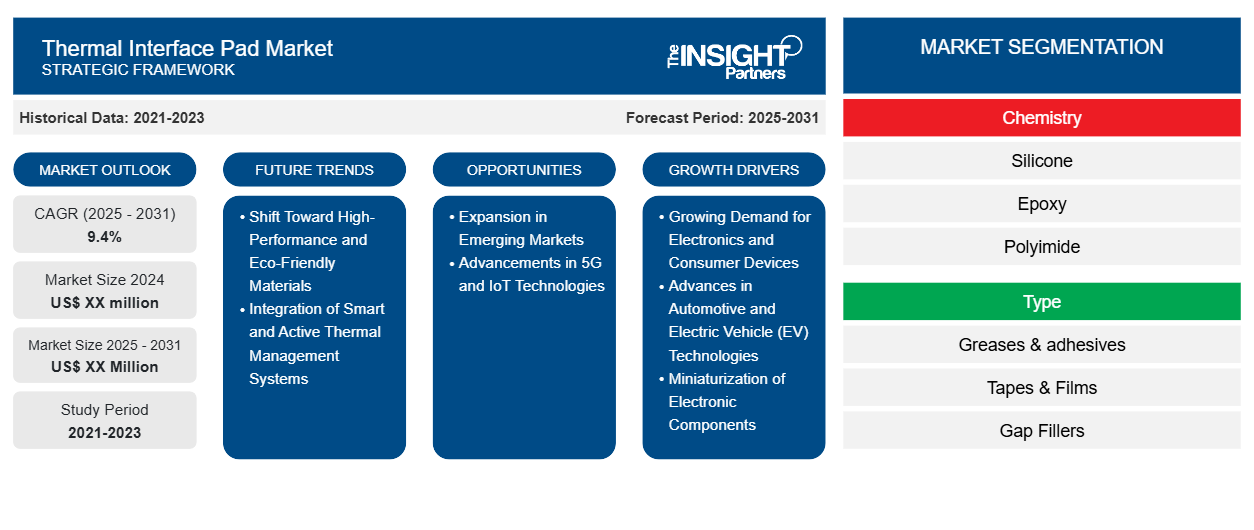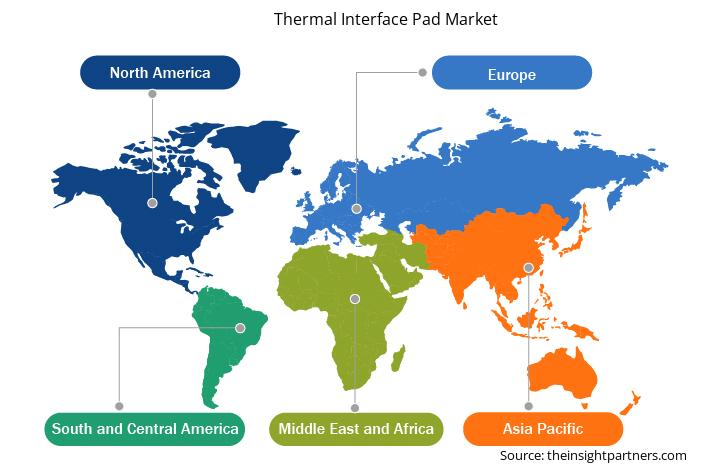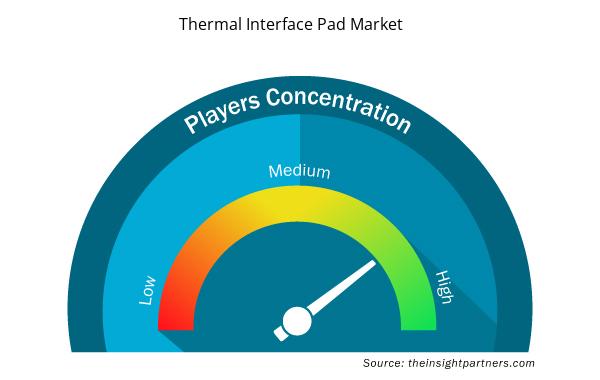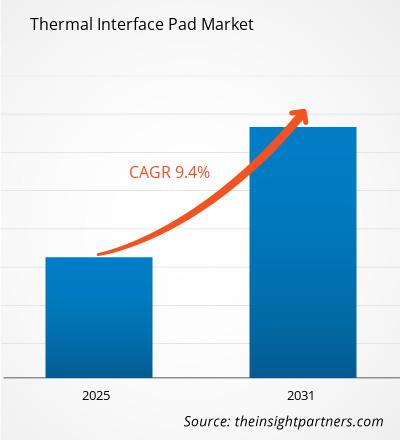The Thermal Interface Pad Market is expected to register a CAGR of 9.4% from 2025 to 2031, with a market size expanding from US$ XX million in 2024 to US$ XX Million by 2031.
The report is segmented by Chemistry (Silicone, Epoxy, Polyimide), Type (Greases & adhesives, Tapes & Films, Gap Fillers), Application (Computers, Telecom, Consumer Durables, Medical Devices). The global analysis is further broken-down at regional level and major countries. The Report Offers the Value in USD for the above analysis and segments.
Purpose of the Report
The report Thermal Interface Pad Market by The Insight Partners aims to describe the present landscape and future growth, top driving factors, challenges, and opportunities. This will provide insights to various business stakeholders, such as:
- Technology Providers/Manufacturers: To understand the evolving market dynamics and know the potential growth opportunities, enabling them to make informed strategic decisions.
- Investors: To conduct a comprehensive trend analysis regarding the market growth rate, market financial projections, and opportunities that exist across the value chain.
- Regulatory bodies: To regulate policies and police activities in the market with the aim of minimizing abuse, preserving investor trust and confidence, and upholding the integrity and stability of the market.
Thermal Interface Pad Market Segmentation
Chemistry
- Silicone
- Epoxy
- Polyimide
Type
- Greases & adhesives
- Tapes & Films
- Gap Fillers
Application
- Computers
- Telecom
- Consumer Durables
- Medical Devices
Geography
- North America
- Europe
- Asia Pacific
- Middle East and Africa
- South and Central America
Customize This Report To Suit Your Requirement
You will get customization on any report - free of charge - including parts of this report, or country-level analysis, Excel Data pack, as well as avail great offers and discounts for start-ups & universities
Thermal Interface Pad Market: Strategic Insights

- Get Top Key Market Trends of this report.This FREE sample will include data analysis, ranging from market trends to estimates and forecasts.
Thermal Interface Pad Market Growth Drivers
- Growing Demand for Electronics and Consumer Devices: As the global demand for electronic devices such as smartphones, laptops, and gaming consoles continues to rise, the need for efficient thermal management solutions also increases. Thermal interface pads are essential components in managing heat dissipation in electronic products, especially in high-performance devices that generate significant heat. This growing demand for electronics drives the need for more advanced and reliable thermal interface materials.
- Advances in Automotive and Electric Vehicle (EV) Technologies: The automotive sector, particularly with the growth of electric vehicles (EVs), is witnessing an increase in the adoption of power electronics that require efficient heat management. Thermal interface pads are used to improve heat conduction between heat-sensitive components like batteries, power inverters, and electric motors. As EV adoption increases, the demand for thermal interface pads in this market is also expected to rise.
- Miniaturization of Electronic Components: As electronic components become smaller and more compact, the need for improved thermal management solutions has surged. Miniaturization leads to higher power densities, which in turn generate more heat in smaller spaces. Thermal interface pads are crucial in these applications, providing effective thermal management to prevent overheating and ensure optimal performance.
Thermal Interface Pad Market Future Trends
- Shift Toward High-Performance and Eco-Friendly Materials: There is a growing trend toward the development and adoption of advanced thermal interface materials that offer both superior thermal conductivity and eco-friendly properties. Materials like graphite, liquid metal, and phase change materials are becoming increasingly popular, as they provide better thermal performance while being less harmful to the environment. Manufacturers are investing in developing sustainable thermal pads to meet both performance and environmental standards.
- Integration of Smart and Active Thermal Management Systems: The integration of smart thermal management systems is another important trend. These systems involve sensors and active cooling mechanisms that can dynamically regulate the temperature of critical components. As industries like telecommunications, computing, and automotive evolve, there is a trend toward integrating thermal interface pads into these smart systems, which are designed to optimize heat dissipation in real time.
Thermal Interface Pad Market Opportunities
- Expansion in Emerging Markets: The growth of industries such as consumer electronics, telecommunications, and automotive in emerging economies offers significant opportunities for thermal interface pad manufacturers. As these markets expand, the demand for thermal management solutions, including thermal interface pads, will increase. Countries in Asia-Pacific, Latin America, and Africa present potential areas for growth, especially with the rise of middle-class populations and technology adoption.
- Advancements in 5G and IoT Technologies: With the ongoing rollout of 5G networks and the increasing use of IoT devices, there is a growing need for efficient thermal management solutions to handle the heat generated by these advanced technologies. The deployment of 5G infrastructure and the proliferation of IoT devices create opportunities for thermal interface pads, as they are critical in maintaining the performance and reliability of 5G equipment, base stations, and IoT devices.
Thermal Interface Pad Market Regional Insights
The regional trends and factors influencing the Thermal Interface Pad Market throughout the forecast period have been thoroughly explained by the analysts at Insight Partners. This section also discusses Thermal Interface Pad Market segments and geography across North America, Europe, Asia Pacific, Middle East and Africa, and South and Central America.

- Get the Regional Specific Data for Thermal Interface Pad Market
Thermal Interface Pad Market Report Scope
| Report Attribute | Details |
|---|---|
| Market size in 2024 | US$ XX million |
| Market Size by 2031 | US$ XX Million |
| Global CAGR (2025 - 2031) | 9.4% |
| Historical Data | 2021-2023 |
| Forecast period | 2025-2031 |
| Segments Covered |
By Chemistry
|
| Regions and Countries Covered | North America
|
| Market leaders and key company profiles |
Thermal Interface Pad Market Players Density: Understanding Its Impact on Business Dynamics
The Thermal Interface Pad Market market is growing rapidly, driven by increasing end-user demand due to factors such as evolving consumer preferences, technological advancements, and greater awareness of the product's benefits. As demand rises, businesses are expanding their offerings, innovating to meet consumer needs, and capitalizing on emerging trends, which further fuels market growth.
Market players density refers to the distribution of firms or companies operating within a particular market or industry. It indicates how many competitors (market players) are present in a given market space relative to its size or total market value.
Major Companies operating in the Thermal Interface Pad Market are:
- 3M
- DOW Corning
- Henkel AG
- Laird Technologies
- Parker Hannifin Corp
Disclaimer: The companies listed above are not ranked in any particular order.

- Get the Thermal Interface Pad Market top key players overview
Key Selling Points
- Comprehensive Coverage: The report comprehensively covers the analysis of products, services, types, and end users of the Thermal Interface Pad Market, providing a holistic landscape.
- Expert Analysis: The report is compiled based on the in-depth understanding of industry experts and analysts.
- Up-to-date Information: The report assures business relevance due to its coverage of recent information and data trends.
- Customization Options: This report can be customized to cater to specific client requirements and suit the business strategies aptly.
The research report on the Thermal Interface Pad Market can, therefore, help spearhead the trail of decoding and understanding the industry scenario and growth prospects. Although there can be a few valid concerns, the overall benefits of this report tend to outweigh the disadvantages.
- Historical Analysis (2 Years), Base Year, Forecast (7 Years) with CAGR
- PEST and SWOT Analysis
- Market Size Value / Volume - Global, Regional, Country
- Industry and Competitive Landscape
- Excel Dataset



Report Coverage
Revenue forecast, Company Analysis, Industry landscape, Growth factors, and Trends

Segment Covered
This text is related
to segments covered.

Regional Scope
North America, Europe, Asia Pacific, Middle East & Africa, South & Central America

Country Scope
This text is related
to country scope.
Frequently Asked Questions
Some of the customization options available based on the request are an additional 3–5 company profiles and country-specific analysis of 3–5 countries of your choice. Customizations are to be requested/discussed before making final order confirmation# as our team would review the same and check the feasibility
Shift Toward High-Performance and Eco-Friendly Materials is likely to remain a key trend in the market.
Key players in the thermal interface pad market include 3M, DOW Corning, Henkel AG, Laird Technologies, Parker Hannifin Corp., Honeyvvell International Inc., The Bergquist Company, Stockwell Elastomerics, Inc., Fujipoly, and Grattech International Holdings Inc.
The major factors driving the thermal interface pad market are:
1. Growing Demand for Electronics and Consumer Devices.
2.Advances in Automotive and Electric Vehicle (EV) Technologies
The thermal interface pad market is estimated to witness a CAGR of 9.4% from 2024 to 2031

 Get Free Sample For
Get Free Sample For